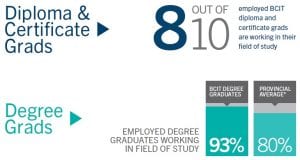BCIT puts British Columbians to work, and CKNW wants to know how.
BCIT turns out higher-paid and more employable graduates than other post-secondary institutions in the province, supplying the province with a skilled and talented workforce.
CKNW has launched its 3rd installment of Putting BC To Work—a four-week series that asks whether the lower mainland is a ready for a changing economy:
Is Vancouver a city on the brink of new technologies and careers, or is our economic success still supported by old world industries and trade? Are we keeping up with the changing landscape of skills and knowledge necessary to compete globally? What impact is innovation and environment having on our current job market today, and what does that mean for future generations of Vancouverites and careers for tomorrow?
BCIT is a part of the series, discussing how the Institute is integral to BC’s economy. Tune in from April 11-17 to hear how BCIT provides the education and expertise necessary to compete.

“Vancouver has a unique tech environment,'” says Steve Eccles, the Dean of the School of Computing and Academic Studies. “Start-ups are really booming.”
Eccles’ school—Computing and Academic Studies—is the largest Computing and IT education provider in Western Canada, with more than 10,000 individual course registrations every year. All the school’s courses are developed to ensure graduates succeed in industry.

BCIT also helps industry succeed in the new economy. Applied Research at BCIT creates practical learning opportunities for students as it produces new, commercially relevant technology for industry.
Take, for example, BCIT’s micro grid. Started in 2007, the system uses alternative power sources—such as solar—to power the Burnaby Campus. Kim Dotto, the Dean of Applied Research, says the campus is a living lab, with one-of-a-kind research capabilities. “We can model real world situations to provide designs for cleaner energy on demand,” he says.
In this way, BCIT creates environmentally sustainable solutions to meet Canada’s energy needs.
Alex Hebert, Energy and Sustainability Manager at BCIT, agrees that BCIT is driving innovation in the energy sector.
“For example,” he says, “BCIT’s new welding ventilation system helps some of our trades programs become more green. The system only operates when ventilation is actually needed. As a result, we’ve reduced our greenhouse gas emissions by 350 tonnes of CO2 a year. That’s the equivalent of 150,000 litres of gasoline.”
Thanks in part to industry partnerships and applied research, students at BCIT get rare opportunities to work with new technologies before they hit the workforce. They graduate with the skills and talent needed to keep BC’s boom rolling.
Join the conversation with #bctowork


Good morning, I have done msc botany hons. for what courses I am eligible now??
Hi Aryan,
Please reach out to BCIT program advising for specific help: https://www.bcit.ca/advising/contact.shtml
Best of luck!